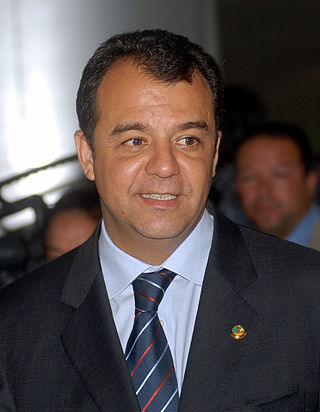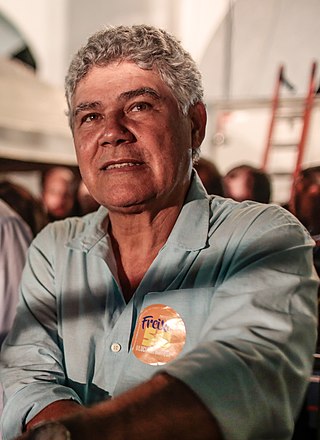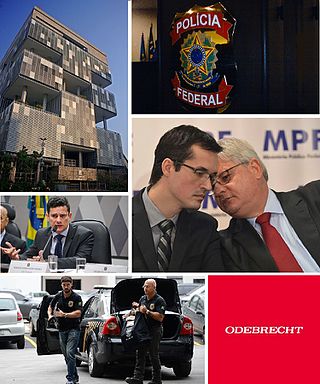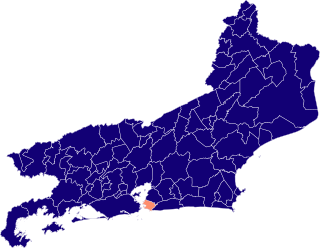
The federative units of Brazil are subnational entities with a certain degree of autonomy and endowed with their own government and constitution, which together form the Federative Republic of Brazil. There are 26 states and one federal district. The states are generally based on historical, conventional borders which have developed over time. The states are divided into municipalities, while the Federal District assumes the competences of both a state and a municipality.

Rio de Janeiro is one of the 27 federative units of Brazil. It has the second largest economy of Brazil, with the largest being that of the state of São Paulo. The state, which has 8.2% of the Brazilian population, is responsible for 9.2% of the Brazilian GDP.

Favela is an umbrella name for several types of working-class neighborhoods in Brazil. The term, which means slum or ghetto, was first used in the Slum of Providência in the center of Rio de Janeiro in the late 19th century, which was built by soldiers who had lived under the favela trees in Bahia and had nowhere to live following the Canudos War. Some of the last settlements were called bairros africanos. Over the years, many former enslaved Africans moved in. Even before the first favela came into being, poor citizens were pushed away from the city and forced to live in the far suburbs.

Human rights in Brazil include the right to life and freedom of speech; and condemnation of slavery and torture. The nation ratified the American Convention on Human Rights. The 2017 Freedom in the World report by Freedom House gives Brazil a score of "2" for both political rights and civil liberties; "1" represents the most free, and "7", the least.
The Social Christian Party was a Christian-conservative political party in Brazil.

In Brazil, the Federal Constitution establishes eight law enforcement institutions - seven titulars and one auxiliar. The titular institutions are: the Federal Police, the Federal Highway Police, the Federal Railroad Police, the Federal Penal Police, the State Military Police and Fire Brigade, the State Civil Police and the State Penal Police. Of these, the first four are affiliated to federal authorities and the latter three are subordinated to state governments. These public safety institutions are part of the Executive branch of either federal or state government. Apart from these eight institutions, there are others which affiliate to municipal authorities: the Municipal Guards. According to Minister Alexandre de Moraes of the Supreme Federal Court, "...the Municipal Guards are inserted in public safety as the auxiliary and related body of public security force..." Federal law 13,022 gave them de facto and de jure police attributions.

Republicans, formerly known as Brazilian Republican Party and originally formed as the Municipalist Renewal Party is a Brazilian political party. Its electoral number, the numerical assignment for Brazilian political parties, is 10.

Sérgio de Oliveira Cabral Santos Filho is a Brazilian politician and a journalist

In Brazil, the Civilian Police is the name of the investigative state police forces.

The Independence Day of Brazil, commonly called Sete de Setembro, is a national holiday observed in Brazil on 7 September of every year. The date celebrates Brazil's Declaration of Independence from the United Kingdom of Portugal, Brazil and the Algarves on 7 September 1822.

The Military Police of Rio de Janeiro State (PMERJ) like other military polices in Brazil is a reserve and ancillary force of the Brazilian Army, and part of the System of Public Security and Brazilian Social Protection. Its members are called "state military" personnel.

Alessandro Lucciola Molon is a Brazilian teacher and politician, member of the Brazilian Socialist Party (PSB) and former Leader of the Opposition in the Chamber of Deputies. He was the rapporteur to Brazil's Bill of Rights for the Internet, ensuring net neutrality, privacy protection and freedom of expression online.

Rodrigo Felinto Ibarra Epitácio Maia is a Brazilian politician who served as the President of the Chamber of Deputies of Brazil between July 2016 and February 2021. A member of the Brazilian Social Democracy Party since 2022, he is the son of former Rio de Janeiro Mayor Cesar Maia and was reelected five times as a congressman until 2023, when he decided to not run for a sixth term in the Chamber of Deputies. Maia was affiliated to the Democrats party, formerly PFL, from 1996 to 2021, when he was expelled from the party for criticizing the party president, ACM Neto.

Francisco Rodrigues de Alencar Filho, known as Chico Alencar, is a Brazilian politician, historian, and writer, affiliated with the Socialism and Liberty Party (PSOL).

The Rio de Janeiro gubernatorial election of October 2018 was for the election of the Governor and Vice Governor of Rio de Janeiro and 70 State Deputies. People also voted for 2 of 3 Senators of the state representation in the Federal legislative power, with 45 federal deputies representatives of the Rio de Janeiro State. A second round was held after no candidate managed to secure more than 50% of the Governor votes.
Brazilian militias, mainly in Rio de Janeiro, and some other cities of Brazil, are illegal mafia-like paramilitary groups made up of current and former police officers as well as Military Firefighters Corps officers, criminals, politicians, and military officers, operating also as a regular mafia by trade extortion and political influence.

The 2020 Rio de Janeiro municipal election took place in the city of Rio de Janeiro, Brazil in November 2020 to elect a mayor, a vice mayor, and 51 city councillors for the administration of the city. On the 29 November 2020 run-off election, former mayor Eduardo Paes, of the Democrats (DEM), defeated incumbent mayor Marcelo Crivella of the Republicans (REP), who lost his bid for re-election.

A long series of criminal investigations have occurred in Brazil associated with Operation Car Wash, since the first one began in March 2014. These investigations are considered offshoots of the original phased investigations.

Marina Terra Maggessi de Souza, commonly known as Marina Maggessi, was a Brazilian police officer and politician, affiliated with the Popular Socialist Party (Cidadania).

The 2022 Rio de Janeiro state election took place in the state of Rio de Janeiro, Brazil on 2 October 2022. Voters elected a governor, vice governor, one senator, two alternate senator, 46 representatives for the Chamber of Deputies, and 70 Legislative Assembly members, with a possible second round to be held on 30 October, 2022. Under the Constitution of Brazil, the governor will be elected for a four-year term starting 1 January 2023. and with the approval of Constitutional Amendment No. 111, it will end on 6 January, 2027.

















